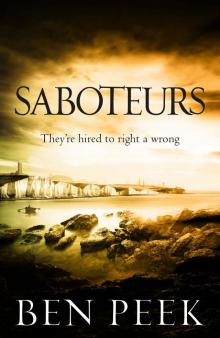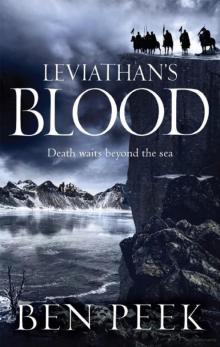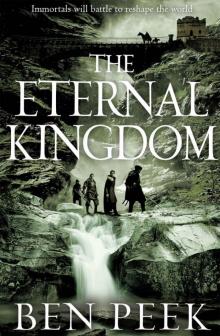The Eternal Kingdom (The Children Trilogy Book 3) Read online
Page 6
As the boy began to run through the bush, the first of the camp’s tents came into clear view before Heast.
It was at that time that he heard the sound of swords ringing against swords.
A small ditch lay in front the first tent and in it lay a Leeran soldier. With an approving eye, Heast noted that the throat had been cut while he had been held, face-first, into the mud. He did not spare the body more than a glance before he stepped from the ditch. He came out from beside the tent, glancing into its open flap to see the limbs of dead men before taking in the sight of the camp before him.
‘Captain.’ Ralen emerged from behind him, his breath ragged. ‘Sergeant Bliq has the north side secure.’
‘Go back to her.’ Heast stared down to the southern end of the Leeran camp, to where the sound of fighting had become louder. ‘Tell her she is to issue commands to finish securing the side and then to bring her unit to the south. Tell her the Ancestor is not yet dead.’
8.
The Ancestor lifted his rain-slicked face to the night sky and howled. The noise pierced the sound of battle as if he were a lone wolf who had been cornered, as if he were a beast calling out to others in his pack, to the soldiers who might still be alive in the camp.
The sound drew Heast along the muddy road. He had passed the Ancestor’s tent just before and seen that the ceiling had been torn away. But it was in the tracks at the front, in the slippery prints of both boots and hands that a sudden push into a standing position was revealed, followed by a charge. The Ancestor had known that the attack was coming, and that left Heast troubled. Taaira would have led the assault on this part of the camp, so it was unlikely that one of his soldiers had given away the element of surprise. Yet, Heast knew that the tribesman would have found the tent empty when he arrived. At that point, he would have realized the danger, and the need to correct it quickly. In setting out after the Ancestor, he would have passed, as Heast did now, the bodies of three men and two women from Corporal Isaap’s unit. They had been ferociously hacked open, the tracks telling how Kilian had thrown himself at them, leaving Heast surprised that the Corporal and the last of his two soldiers were not among the dead. He found them shortly after, when the rest of the camp revealed itself, the three soldiers with Kye Taaira.
Behind him, he heard Bliq and her unit running up the muddy road, but he did not turn from the sight before him.
The Ancestor was forcing his way to the stables at the end of the camp, carving a trail with sheer ferocity. In each of his large hands, he held a great axe, and he wielded both in long, deadly slashes that forced any who came close to him to duck and weave backwards. Taaira had gathered up the majority of small units that had surged to the south-eastern part of the camp under Heast’s command and pushed them into a larger force – fifty, he counted – with Taaira in its centre. The glow of his old sword was visible to Heast even through the hardening rain, and the light of it made it clear that the tribesman could not find the space to strike at the Ancestor. The latter had gathered a small force of thirty Leerans around him in his charge and their discipline had given him the advantage.
Heast was not surprised. In pure numbers, he had three soldiers for every Leeran in the camp; but in terms of trained and seasoned fighters, he did not have the same dominance. There had been seventeen veterans left in Maosa when Heast took command, and another ten, like Isaap, who had been pushed into ranked positions they were not ready for yet. In many ways, he viewed his small army as a mirror of the Leeran force as a whole, which had been forged of the nation’s military and its people. It had been brought together under a new god and the command of General Waalstan and, though Se’Saera had bonded her soldiers together through blood to strengthen them, the truth was that a year of steady fighting had eroded the distinction between the two groups, a difference Heast was easily aware of in his own.
‘Sergeant Bliq.’ He addressed the short, thickset, olive-skinned woman beside him. ‘The Ancestor is making his way to the stable. If he gets there, he’ll try to run to another outpost. Sergeant Qiyala has already recognized the danger and is drawing the southern units to her. I want you to reinforce the defensive line she is making there.’
‘He’ll turn.’ She was one of the veterans: all his sergeants were. ‘When he sees that, he’ll simply turn. Let me grab the others and reinforce this side first.’
‘When he turns,’ Heast said evenly, ‘I want you to charge him and break the Leerans that are supporting him.’
She grunted sourly. ‘That’ll leave you in the open, sir.’
‘Do you understand the order I have given?’
‘Yes, Captain,’ she said, and began down the road, past the collapsed tents and dead men and women.
‘Ralen.’ Heast turned. ‘Tell Anemone she is needed.’
The boy ran to the left, through the tents and into the bush, his eyes wide.
Heast had done as much with the men and women from Maosa as he could. By and large, he was satisfied by their progress, but without seasoned soldiers to fill their ranks, they would struggle against the Leerans. Worse, he would simply be unable to press hard against General Waalstan—
The Ancestor turned.
At the sight of Heast alone, Kilian charged. His large feet tore up the ground as he stretched out his arms, his axes extended like wet metal wings.
Behind the Ancestor, Bliq let out a loud cry and, supported by Qiyala, the two units surged forwards.
The Leeran soldiers took a step back to defend themselves, but could not organize enough of a defence before the swords of Heast’s force crashed through in an ugly and brutal violence. Worse for the Leerans, the actions drew in the surrounding soldiers who had held the ring with Taaira and relieved the tribesman of the defensive act he had been maintaining. Rather than follow the soldiers into the battle, however, he began to chase down the Ancestor.
Heast dropped his hand to the hilt of his sword, but did not draw it.
The tribesman was struggling to close the gap between the two. For every two steps that the Ancestor took, he was forced to take four. It was clear that he would be unable to stop Kilian before he reached Heast. Yet the Captain of Refuge did not move.
In the centre of Kilian’s elongated chest was the ghostly shape of a man. The shadowy figure was twisted and hunched, as if a great pain had been inflicted on him. Ignoring the bloodshot gaze of Kilian, Heast focused on the real face of the Ancestor and thought how small he appeared in comparison to the body he possessed, how tiny and cruel his appearance once. Lost in the sight of it, Heast did not flinch as the large man drew closer and closer and the first of his axes lifted to come crashing down—
Only to find that it would not.
Roaring, the Ancestor lifted his other axe, but that too was suddenly weighed down, as if a dozen hands had caught it and stilled it with all their strength.
‘I have a witch,’ Heast said calmly. ‘She will hold you long enough for the Hollow to reach you.’
A moment later, Kye Taaira’s heavy sword burst through the Ancestor’s back.
9.
The wreckage appeared an hour before dawn, just as Se’Saera had said.
Beneath the last of the moonlight, it was not at first clear what had caused the ship to wreck. The rocky beach stretched around the broken hull like the jaws of a giant animal, itself torn apart by the act of destruction on the vessel. The imagery lingered in Bueralan’s mind as he rowed through the choppy surf to the wreckage and grew stronger when, near to the broken hull, Aela Ren reached into the black water and pulled out a limb. It was a man’s arm, brown-skinned and thick with fat and muscle quickly going to rot. In the pale light, the Innocent turned the limb over in his own brown, scarred hands without revulsion. As he did, Bueralan brought the small dinghy along the ship’s shattered bow, turning around the broken edges to gaze at the front that had been torn out, as if by the teeth similar in size to the rocks that lay in the water before the hole.
It was in that wreckage th
at Ren lashed a rope to a beam to hold the dinghy in place. After he attached it, the small man disappeared into the dark of the hull, leaving Bueralan to pull the oars in and follow him. As the saboteur stepped onto the deck, a match sparked and a lamp that sat on the ground bloomed, the light slowly revealing the bodies of men and women across the broken deck.
Each had been torn apart, ripped as if they were but raw meat.
‘Mercy,’ Bueralan whispered.
‘There is no mercy here.’ The Innocent lifted the lamp, the scars along his arms running back and forth like lit wires. ‘It is doubtful that there is mercy anywhere in the world, any more.’
Bueralan knelt beside one of the corpses, one close to the broken edge of the hull. There, he reached for the piece of silver that had caught his eye. ‘Mercy is the name of this ship.’ He pulled the small badge from the blood-slicked collar and held it up. ‘This is Captain Islan’s mark. This is her ship. She docks in Leviathan’s End.’
‘Leviathan’s End is not a nation,’ the other man said. ‘It has no fleets.’
‘Captain Islan is a mercenary.’ The badge had an empty flag beneath an undefined face. ‘All mercenaries call Leviathan’s End their home.’
‘Not all do. You know that as well as I do. But tell me—’ Ren’s lamp shone over a black-skinned woman, her body encased in black-and-red armour – ‘How did one of the First Queen’s soldiers come to be here?’
Bueralan stared at her face, the bone crushed and, in places, ripped away.
‘Do you know her?’ the Innocent asked.
‘No.’ He turned the badge over in his fingers and rose to his feet. ‘What could have torn off her face like that?’
‘A human hand.’
Bueralan wanted to disagree. As he examined the other bodies, he saw indents in the armour that had been made by hand, grooves that his hands could fit into. Despite his thoughts of a giant monster, it was clear that no such creature had attacked Mercy and dragged it to the shore. It had not been such a far-fetched thought: there were creatures that lived in the depths of Leviathan’s Blood that rose from the floor only to hunt the men and women who rode across its surface. It was not common, but when they did rise from the ocean bed to take a ship, they did so with long, clear tentacles that splintered hulls and decks. They crushed men and women and broke their bones as if they were nothing but a child’s toy before pulling them down into the water along with the ship. Over a decade ago, on the north of Gogair, Bueralan had seen exactly that. For weeks after, lone bodies had washed up against the shore, each of them a study in pain, but a pain that was not kin to what he saw now.
‘Three humans, to be exact.’ Aela Ren shone the light further down the hull. ‘Each of them clearly much stronger than a normal man or woman.’
‘Like you?’
‘Like us,’ he corrected.
‘You didn’t answer my question.’
When he turned, the glare of the lamp caught his skin, and the scars along his face ignited. It was as if the lasting impression of trauma that his god, Wehwe, had inflicted upon him at his death had broken through. ‘No. There are two men and one woman who are not with us,’ he said. ‘But the nature of the destruction is not theirs.’
Ahead, a part of the deck they stood on broke away, revealing the hold beneath. Both men approached the edge and, as Ren swung the lamp out far to light what was below, dozens of crates were revealed. Leviathan’s Blood had flooded most of the hold, but in that inky dark water, none of the crates floated. On them was a soldier bent at a terrible angle, with wood both around and through him, as if he had been the cause of the break in the deck, as if he had been slammed into it, then through it, before he crashed against the crates and tore them open. The jagged edges revealed silver and gold bars, bars that no one had made an effort to even try and loot.
‘Someone was fleeing,’ Bueralan murmured.
‘The First Queen was fleeing,’ Aela Ren said. ‘It could very well be that what Se’Saera saw in her dream was real.’
‘She said that we would swim to the ship,’ he said, unable to disagree with the other man fully, ‘but we did not.’
‘Quite true.’ Above them, the top deck of the ship groaned. ‘And she made no mention of those who caused this.’
The stairs that led onto Mercy were narrow and empty, and Bueralan followed the Innocent up them, his hand on the hilt of the sword the other had let him reclaim.
He was not sure what he expected to find at the end of the stairs, though he knew that there would be more dead. Indeed, the first thing that the light of Aela Ren’s lamp shone across was the broken body of a sailor. But it was not the debris of men and women that drew Bueralan’s gaze once the bloom of the lamp shone across the wide deck of Mercy like a piece of fallen sun. No, rather, it was the three figures that knelt on the deck, their heads bowed, and their arms folded across their chests that he turned towards.
Only one could be mistaken for human: two of them were so heavily deformed that Bueralan was surprised they were alive. Both wore water-soaked furs, indicating that they, at least, had swum onto the ship. The man to his right was the largest of the three, a huge, hulking figure: his flesh had split and been sewn back up with what appeared to be links of chain and wire. In contrast, the man to his left was leaner and taller, so much so that his skin was hollow and sunken, the outlines of his bones easily identifiable, as if he were a half-starved animal.
The last of the three had neither quality. Instead, he wore old leather armour, the design of it a layer of wrapping, with each individual length tightened around his white skin, turning it into a new, darker skin, one that shifted with him as he rose to his feet, as he held his leather-wrapped hands together and bowed his head. He had short blond hair that took on an almost white quality in the night and sat atop a smooth and unblemished face.
‘My Lord,’ he said in a voice that was soft, yet without kindness. ‘We await our god with one of the gifts she so desired. We await with it to beg forgiveness.’
It was then, as the man’s gaze rose, that Bueralan saw the woman’s body strung from one of Mercy’s masts.
10.
As the morning’s sun began to rise, the slaughter of the Leeran horses began.
‘I must admit, Captain, that I find these acts particularly distasteful.’ As Kye Taaira spoke, his gaze followed two men walking to the southern stables. ‘I should not find it difficult to reconcile, but I do. An hour ago I watched men and women die in battle. Some I knew, some I did not. But already, I know that it is not their faces I will remember from this day, but the silence of those animals as the blades strike deeply inside them.’
‘The beasts have been bonded with the soldiers they serve.’ Heast had given the job to men who had been butchers in Maosa. They had greeted the morning’s work with a sombre acceptance, for which he was both grateful and understanding. ‘If I could, I would have it another way: we need horses, and when we don’t need horses, we need the money they bring. But Anemone insists that there is nothing else to be done. They’ll simply starve if we leave them.’
‘That is why I will remember them before the men and women,’ the tribesman said. ‘For in them, the offer of our new god is clear: servitude or death.’
‘Or rebellion.’
‘I do not think she offers that, Captain.’
Heast turned away from the stable as the two men entered, their butcher’s blades drawn. ‘It is the third option,’ he said. ‘The old gods understood that and if the new god does not, then she will soon enough.’
‘I do not think that tonight has warranted such optimism.’
‘No,’ he admitted, ‘it has not.’
Slowly, he made his way through the quiet camp. Heast had lost eleven soldiers in the raid, but in this, he considered himself fortunate. The potential for further deaths had been there. From the silence of the soldiers around him, their sombre salutes and muted conversations, everyone knew that they had been lucky. Individual acts had kept the
casualties low and individual acts had ensured their victory. In the last months, Heast had drilled into his soldiers that an army had to be more than its individuals, that it had to be able to succeed, with or without them. ‘In battle, each one of us must be able to step into the role of another. One death must not spell a weakness for us.’ Before the raid, Heast had known that he had not achieved that: his position was too valuable, as was Anemone’s and Taaira’s.
Ahead, the largest tent in the camp sat darkly, waiting for both Heast and Taaira. Made from the same green fabric as the others around it, the tent was three times the size of those. Its roof was weighed down by water from the night’s rain and a guard stood outside, though Heast doubted that the precaution was necessary. When he stood close to the tent, he had the impression of it having its own presence, as if the fabric that had been wrapped around the wooden structure kept the essence of a watchful eye.
Inside, the sensation increased uncomfortably.
‘It is a dark room,’ Anemone had said to him, when he first stepped in. ‘Not just in the light that is here, but in the acts that have been done here. Grandmother says that the fewer people who enter, the better.’
He had nodded and the order, when given, had been easily obeyed.
The witch had remained in the tent alone while Heast made his inspection of the camp, and she did not rise when he and Taaira returned. Instead, she continued to work through the narrow boxes before her, having already gone through the items that had been laid out on the floor: the small boxes, the knives and the glass jars.
Heast had not expected to find the Anemone who sat before him in Maosa. He had arrived looking for the woman she called her grandmother, a woman who had had the name she now bore, and who had been old for all of Heast’s life. Yet, when he had arrived, he had learned that the Anemone he had known had died. In her place stood the slim, olive-skinned girl who hid herself in oversized clothes and dyed her hair an unnatural red. She was Anemone now.

 Saboteurs
Saboteurs The Godless
The Godless Leviathan's Blood
Leviathan's Blood Dead Americans
Dead Americans The Eternal Kingdom (The Children Trilogy Book 3)
The Eternal Kingdom (The Children Trilogy Book 3)